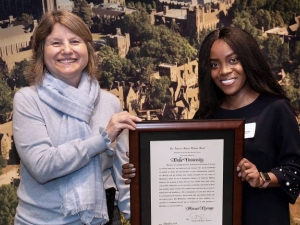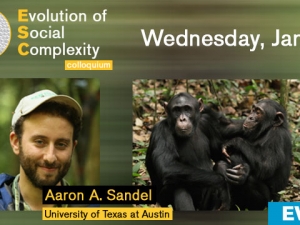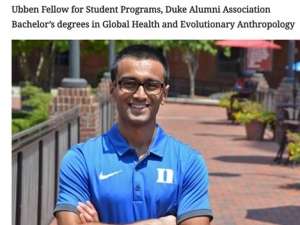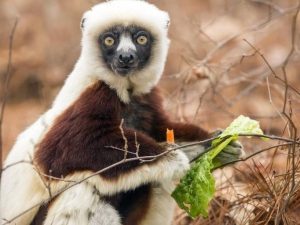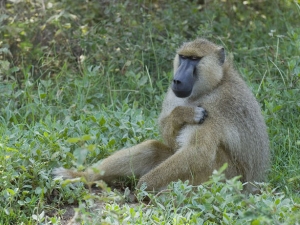In chimpanzee society, males spend their entire lives in the group where they were born, cooperating to defend their territory, while females tend to move away. But some chimp females seem less willing to cut the apron strings. New findings from researchers at Duke University and North Carolina State University show that female chimpanzees with high-ranking mothers are more likely to be homebodies. The study suggests that the perks of having a powerful mom can make it worthwhile for some females to stay and reproduce in the… read more about Female Chimps With Powerful Moms Are Less Likely to Leave Home »
If you asked Jenny Tung’s parents, “no one’s kids that they knew of went off to Africa every summer to look at monkeys.” But Tung has been doing just that since her first trip to Kenya in 2006 to study the wild baboons of Amboseli. She joined a research project that year that had been watching the same troops of free-ranging baboons within sight of Mt. Kilimanjaro since 1971, witnessing pairings, births, fights, deaths. Many generations of baboons later, the Amboseli Baboon Research Project is still going on, and… read more about Duke's Jenny Tung Wins $625k MacArthur Foundation Genius Grant »
Anyone who says females are the ‘gentle sex’ has never met a lemur. Lady lemurs get first dibs on food, steal their mates’ favorite sleeping spots and even attack males, swatting or biting those that annoy them. What gives these female primates the urge and ability to reign supreme while the meeker males give in or get out of the way? New research suggests that female lemurs’ bullying behavior may get programmed early, before birth. A Duke University study shows that a mother lemur’s hormone levels during pregnancy can have… read more about Lemur Sex Role Reversal Gets Its Start in the Womb »
DURHAM, N.C. -- This fall, Duke University will be admitting seven students that have four legs instead of two. In the first program of its kind, the Duke Canine Cognition Center will welcome to campus seven puppies from Canine Companions for Independence, the leading assistance dog non-profit in the U.S. The puppies are part of a long-term study funded by the National Institutes of Health to assess the effects that different rearing strategies have on the behavior and cognitive development of assistance dogs. The dogs will… read more about Duke Puppy Kindergarten Admits Seven New Students »
DURHAM, N.C. -- A team of Peruvian and American scientists have uncovered the 18-million-year-old remains of the smallest fossil monkey ever found. A fossilized tooth found in Peru’s Amazon jungle has been identified as belonging to a new species of tiny monkey no heavier than a hamster. The specimen is important because it helps bridge a 15-million-year gap in the fossil record for New World monkeys, says a team led by Duke University and the National University of Piura in Peru. The new fossil was unearthed from an… read more about World's Smallest Fossil Monkey Found in Amazon Jungle »
DURHAM, N.C. -- Duke University scientists have given us another way to tell which endangered lemur species are most at risk from deforestation -- based on the trillions of bacteria that inhabit their guts. In a new study, researchers compared the gut microbes of 12 lemur species across the island of Madagascar, where thousands of acres of forest are cleared each year to make way for crops and pastures. The team found that some lemurs harbor microbes that are more specialized than others for the forests where they… read more about EvAnth Alum publishes lemur research »
Duke professors Susan Alberts and Sue Jinks-Robertson have been elected to the U.S. National Academy of Sciences, which is widely considered one of the highest honors a scientist can receive. They are among 100 newly elected members and 25 foreign associates who are recognized for their achievements in original research -- 40 percent of whom are women, the most ever elected in any one year to date. Alberts studies how animal behavior evolved in mammals, with a focus on the social behavior, demography and genetics of… read more about Two Duke Faculty Elected to National Academy of Sciences »
Congratulations Professor Alberts on this prestigious honor! read more about Susan Alberts, Chair of Evolutionary Anthropology, elected to National Academy of Sciences »
On Friday, Duke honored the generous spirits of staff member Niasha Fray and students Idalis French and Moreen Njoroge with the Algernon Sydney Sullivan Award. The award recognizes one graduating senior and one member of the faculty, staff or graduate student body of Duke University or Duke University Health System for their outstanding commitment to service. The award was established in 1925 to honor the memory of Sullivan, a southerner who became a prominent lawyer, businessman and philanthropist in New… read more about EvAnth Alum wins Algernon Sydney Sullivan Award »
EvAnth Alum, Dr. Aaron Sandel, is now an assistant professor at the University of Texas at Austin. See link below for information on a talk he recently gave at the University of Arizona (story) read more about EvAnth alum now an assistant professor at Univ. of Texas, Austin »
Through the work of Professor Thomas Struhsaker (Evolutionary Anthropology) and Craig Breaden (Duke Libraries), five old films about primate behavior, ecology, and conservation have been converted to a digital format. The films, which range in release date from the 1960s to the early 2000s, can be accessed free of charge at Dr. Struhsaker's archive at https://archive.org/search.php?query=thomas%20struhsaker. A brief synopsis of each film can be found below: 1) Behavior and ecology of vervet monkeys (… read more about Primate behavior, ecology, and conservation films »
The Department of Evolutionary Anthropology at Duke University invites applications for two three-year post-doctoral positions at the Assistant Research Professor level to begin in July of 2018. Each post-doc will contribute to the department’s teaching mission by teaching two courses each semester, and each is also expected to be active in research. Teaching and research will be supported in part through mentoring by senior faculty members. Consideration will be given to applicants in all areas of Evolutionary… read more about Evolutionary Anthropology Post-Doctoral Teaching and Research Position »











